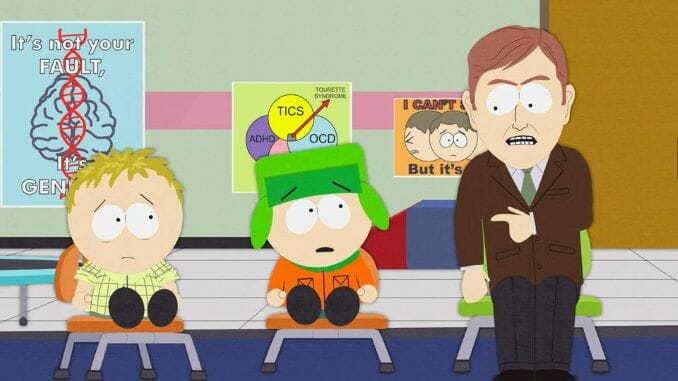14 Years Ago South Park Understood Tourette Syndrome More Than Any Other Movie or TV Show

I was seven years old when, after several dead ends and misdiagnoses, a neurologist at Chicago’s Rush-Presbyterian-St. Lukes Medical Center told my parents I had Tourette Syndrome. In a way, it was a relief: Doctors and teachers had tried to explain my compulsive throat-clearing, grunting, and gesticulating as everything from a sore throat to evidence I had been abused. When my tics were at their worst, other kids launched pointed glares my way in class while teachers made a point of pausing their lessons to ask me if I needed to go get a drink from the water fountain. Tourettes, I thought, wrapped up that part of me into a neat little package, something I could point to and explain to the world that I didn’t have any control over my tics, not really. But of course, the world has never been that rational.
Disability, as the modern wisdom goes, is a social construct. I don’t think there’s any condition that illustrates that as powerfully as Tourette Syndrome does. People who have Tourettes are as intelligent and as grounded in reality as those who don’t, and, apart from the occasional aching chest from forcing out a barrage of vocal tics or chafed skin from performing the same gesture repeatedly, we don’t generally suffer any physical ill effects from it. Instead, our illness is measured in its social inconvenience to others—the meetings we interrupt, the library patrons we distract, or, for the 10% or so of cases with coprolalia, the swear words we blurt out in public.
14 years ago, with the release of the episode “Le Petit Tourette,” South Park got that. In fact, I’d go so far as to say it’s one of, if not the only, worthwhile pieces of media ever made about having Tourette Syndrome. If you’re surprised to hear me call the show that once made an entire episode about its 10-year-old protagonists shoving tampons up their asses an icon of understanding and sensitivity, you’re not alone. When the Tourette Syndrome Association found out that Trey Parker and Matt Stone were making an episode about the disorder, they released a statement preemptively saying they fully expected it to be “offensive and insensitive.” What actually aired, however, was surprisingly touching, not to mention gut-busting.
If you haven’t seen “Le Petit Tourette,” it goes something like this: Cartman is in a toy store when he encounters Thomas, a boy with Tourettes who uncontrollably shouts obscenities, but is greeted with acceptance from the staff and other shoppers after his mother explains his condition. (Meanwhile Thomas, with all eyes on him, is begging her to leave.) Inspired, Cartman decides to fake having Tourettes because he believes it will let him say whatever he wants with no consequences, no matter how offensive, crude, or antisemitic. He manages to fool a doctor, his parents, his teachers, and, at one point, Chris Hansen of To Catch a Predator, but immediately gets made by Kyle.
-

-

-

-

-

-

-

-

-

-

-

-

-

-

-

-

-

-

-

-

-

-

-

-

-

-

-

-

-

-

-

-

-

-

-

-

-

-

-

-








































